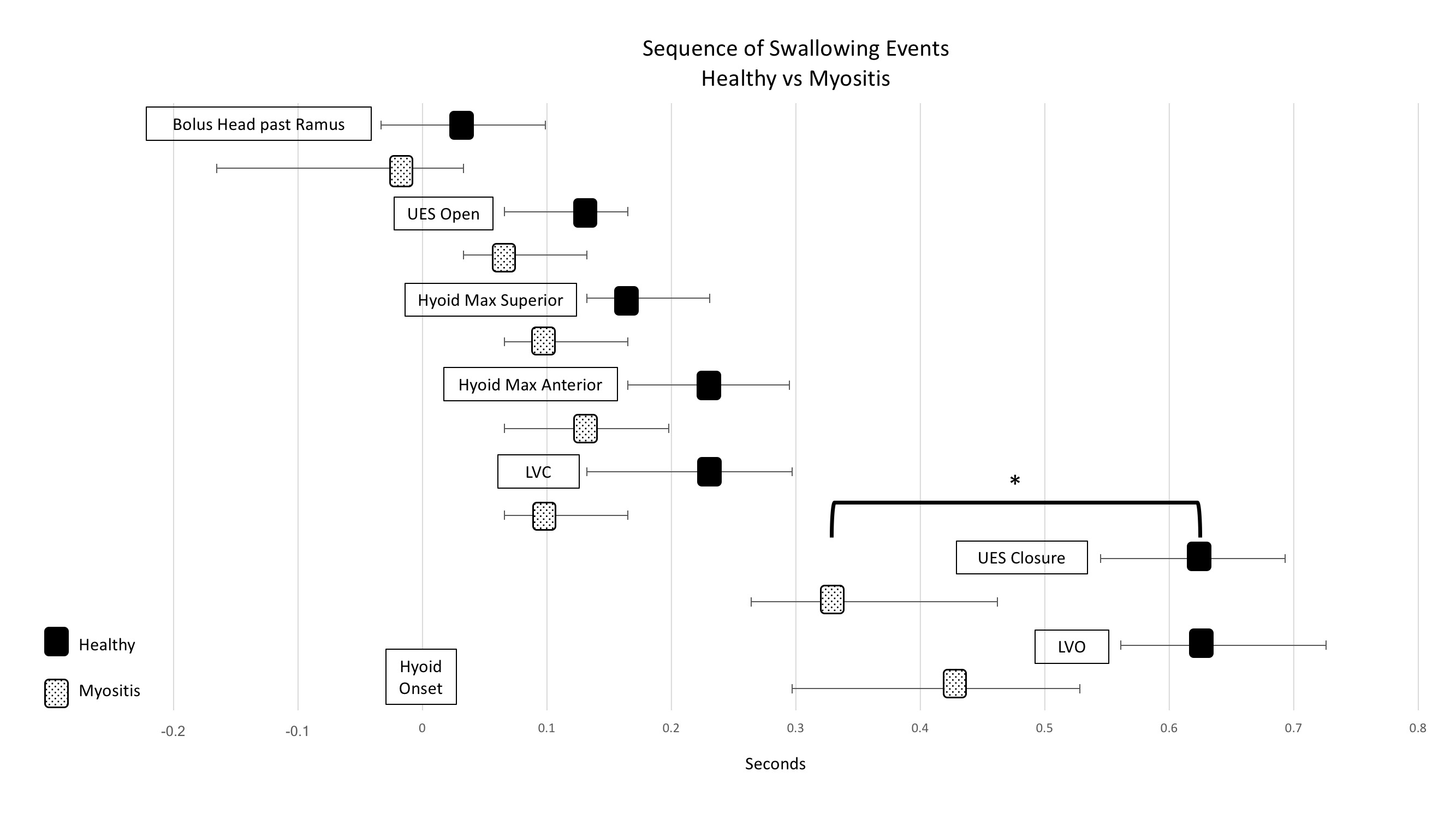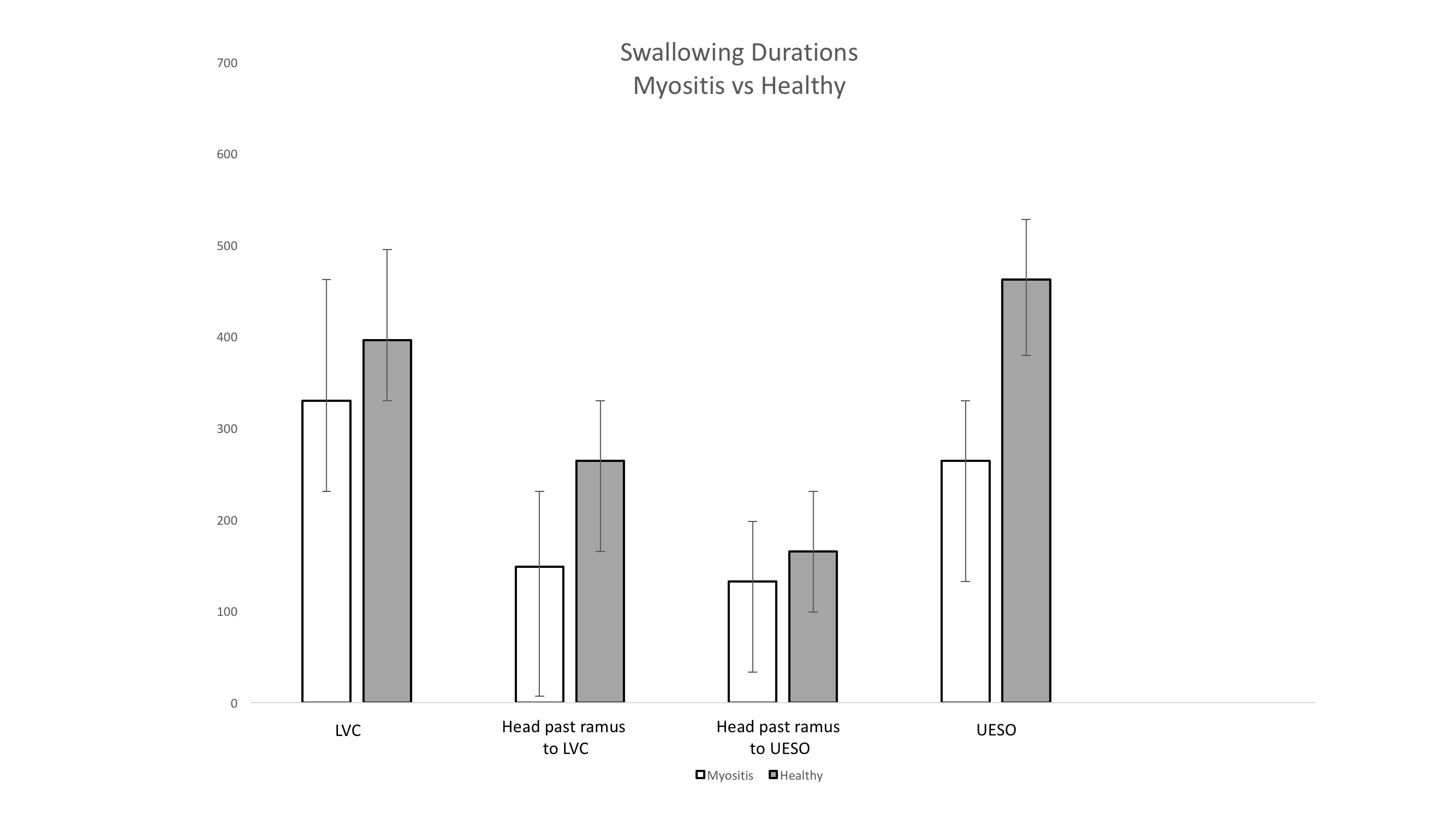Session Information
Session Type: ACR Poster Session C
Session Time: 9:00AM-11:00AM
Background/Purpose:
The prevalence of dysphagia in patients with inflammatory myopathies has been reported to be as high as 60% (1). Aspiration pneumonia is one of the main causes of mortality in patients affected by immune mediated myositis, especially in those with chronic deterioration(2). The goal of this study was to characterize the pathophysiologic changes in swallowing of myositis patients by examining videofluoroscopic swallow studies (VFSS) for kinematic, temporal, and functional measures of swallowing.
Methods:
VFSS of 23 myositis patients (IBM= 7, Necrotizing= 2, DM= 13, PM =1, age range= 21-81) complaining of dysphagia were collected, and frame by frame analysis of temporal and kinematic measures were performed. The swallows of each subjects were rated by MBSImPª© and Penetration-Aspiration Scale. Swallowing measures from patients were compared to those from 64 healthy subjects (ages range= 18-90) by Wilcoxon rank-sum tests.
Results:
In patients with myositis, food entered the pharynx earlier relative to the initiation of swallowing than in healthy participants (p<0.0001). Myositis patients had a significantly shorter duration of upper esophageal sphincter (UES) opening and laryngeal vestibule closure than healthy subjects (p<0.0001). There were no statistically significant differences in AP diameter of the UES between healthy subjects and myositis patients (p=0.9). In myositis patients, several MBSImPª© component scores indicated impairment, particularly those related to residue after swallowing, base of tongue movement, and posterior pharyngeal wall movement. Aspiration was observed in 26% of the patients.
Conclusion:
Swallowing pathophysiology in myositis appears to be related to reduced muscle strength and endurance. Tongue weakness resulted in premature entrance of bolus into the pharynx prior to airway closure. Diminished pharyngeal stripping wave and tongue retraction contributes to poor bolus clearance. Decreased duration of UES opening with preserved extent of anteroposterior diameter suggest conserved ability to open the UES but reduced endurance in the submental musculature to sustain opening. Strength and endurance exercises of the tongue and submental muscles are potential therapeutic targets for preservation of swallowing function in myositis patients.
1. Dalakas, Marinos C., et al. "Treatment of inclusion-body myositis with IVIg A double-blind, placebo-controlled study." Neurology 48.3 (1997): 712-716.
2.Marie et al. (2001). Polymyositis and dermatomyositis: short term and longterm outcome, and predictive factors of prognosis. The Journal of rheumatology, 28(10), 2230-2237.
To cite this abstract in AMA style:
Azola A, Chung T, Mulheren R, Mckeon G, Christopher-Stine L, Palmer J. Dysphagia in Inflammatory Myositis: A Study of the Structural and Physiologic Changes Resulting in Disordered Swallowing [abstract]. Arthritis Rheumatol. 2017; 69 (suppl 10). https://acrabstracts.org/abstract/dysphagia-in-inflammatory-myositis-a-study-of-the-structural-and-physiologic-changes-resulting-in-disordered-swallowing/. Accessed .« Back to 2017 ACR/ARHP Annual Meeting
ACR Meeting Abstracts - https://acrabstracts.org/abstract/dysphagia-in-inflammatory-myositis-a-study-of-the-structural-and-physiologic-changes-resulting-in-disordered-swallowing/


